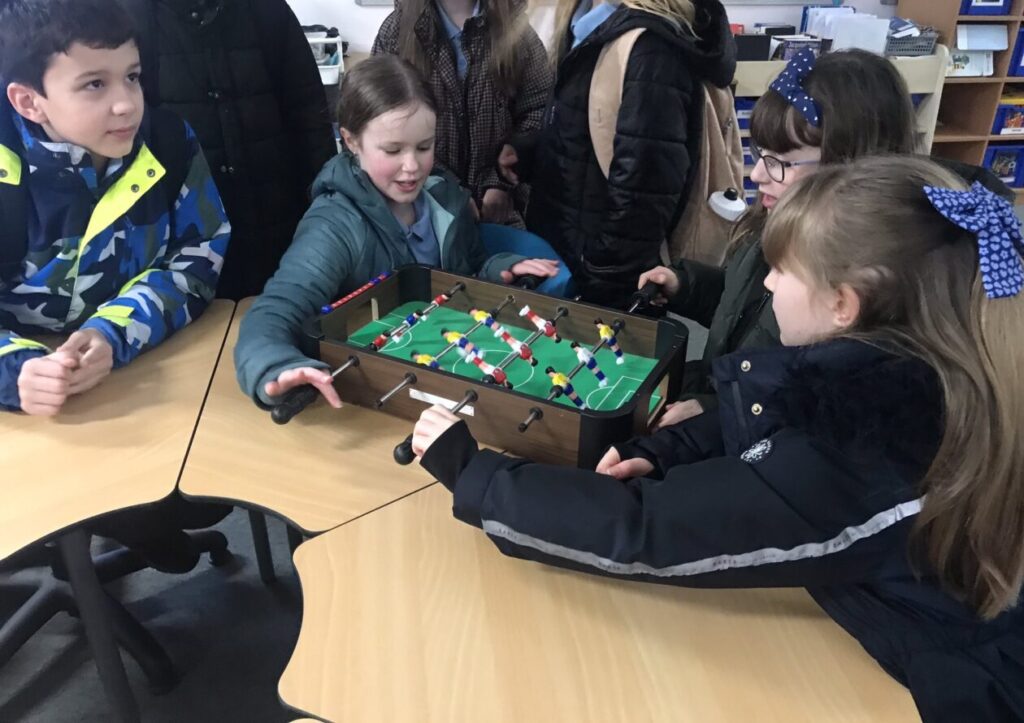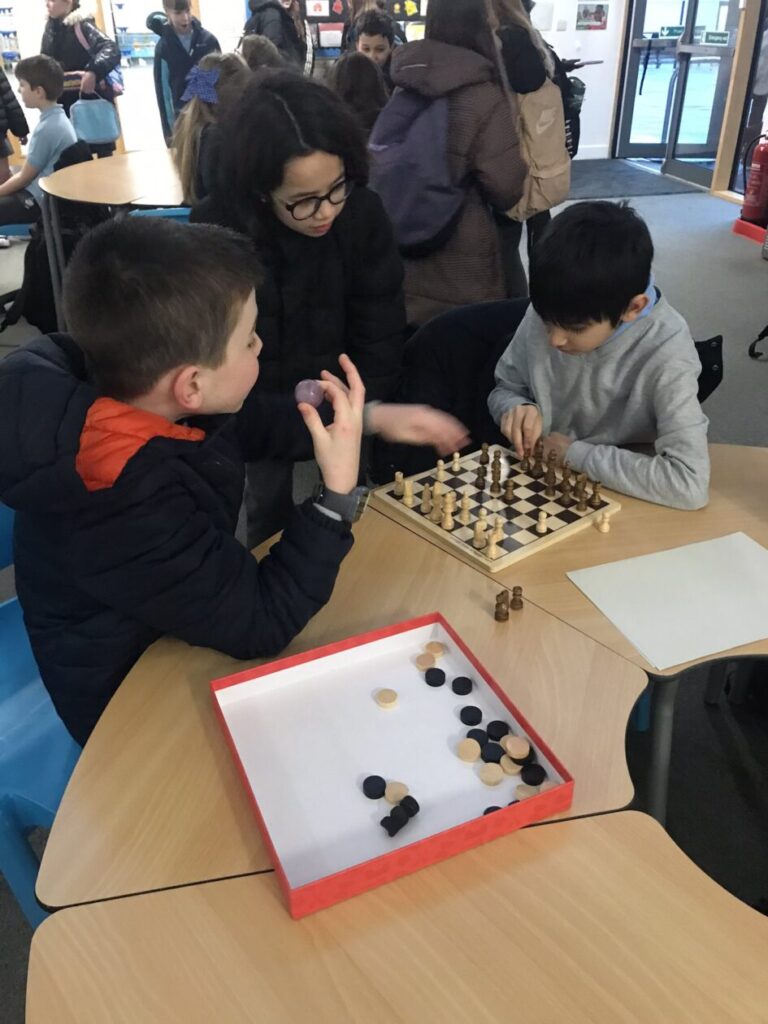Accreditation Audit
Please find attached our Attachment Accreditation Audit. This document highlights our evidence that supports the principle that all behaviour is communication. It demonstrates how our practices, strategies, and interventions are informed by an understanding of pupils’ needs, experiences, and emotional wellbeing, ensuring that behaviour is interpreted and responded to in a supportive and constructive manner.
All Behaviour is Communication Audit
Action Plan

The All Behaviour is Communication Action Plan provides a clear and structured approach to understanding and responding to pupil behaviour. It demonstrates a commitment to supporting pupils’ emotional wellbeing, promoting positive relationships, and implementing targeted strategies tailored to individual needs.
Kirklandpark Primary Attachment Action Plan (Pledge_ All Behaviour is Communication)
QI 1. There is a consistent message that all behaviour is communication and staff are encouraged to take a curious approach to understanding pupils’ behaviour as well as reflecting on their own responses.

Kirklandpark Relationship Policy (Appendix 1 a&b)
Our school policy outlines how positive, respectful, and supportive relationships are built and maintained among students, staff, and the wider school community. Our policy focuses on relational, restorative, and nurturing approaches. Within this document it provides guidance on how our staff can support children’s emotional, social, and behavioural development so they feel safe, valued, and ready to learn.
KP-Relationship-Policy (Appendix 1a)
Relationship Policy Blue Print (Appendix 1b)
Kirklandpark Nurture Policy (Appendix 2)
Within our Kirklandpark Nurture Policy, it outlines the expectations for pupils, staff and parents linking to the Principles of Nurture. This provides a clear and consistent message to all staff helping them understand behaviours within the context of a person’s daily lived experience. Staff recognise that every child has different needs depending on backgrounds and we work together to support our pupils to the best of our ability.
KP-Nurture-Policy (Appendix 2)
Kirklandpark Child Friendly Nurture Principles (Appendix 3)
To make our classroom and shared spaces inclusive and emotionally supportive environments, our Attachment Ambassadors created a child friendly nurture principles display. By presenting self-regulation strategies, and affirming messages in an accessible, age-appropriate format, there is a consistent message across the school that all children understand.
Child Friendly Nurture Principles (Appendix 3)
Kirklandpark Toolkit for Positive Behaviours (Appendix 4)
By creating a quick staff toolkit, it provides all adults at Kirklandpark with clear, accessible strategies for responding to behaviour in a consistent, attachment- and trauma-informed manner. This ensures that every child experiences predictable and emotionally safe interactions, regardless of which member of staff is supporting them.
Toolkit for Positive Behaviour (Appendix 4)
Restorative Language Prompts (Appendix 5)
Restorative language prompts equip our staff with consistent, relationship-focused ways of responding to behaviour. Our staff have the understanding that ‘all behaviour is a form of communication’. These prompts help adults move beyond blame or consequence-driven interactions and instead support pupils to express underlying needs, repair relationships, and learn more positive ways of communicating.
Restorative Language Prompts (Appendix 5)
Attachment Ambassadors (Appendix 6)
Attachment Leads and Ambassadors provide regular updates during school assemblies to reinforce a shared understanding of our attachment- and trauma-informed practice. These updates ensure that all pupils and staff receive a consistent message about the values, expectations, and relational approaches we aim to embed across the school.

Attachment Working Group Updates (Appendix 7)
Our Attachment Working Group hold regular meetings to discuss progress, share insights, and plan next steps. As a team, we prepare and distribute meeting agendas and minutes, keeping our display board updated with relevant information, and uploading essential resources to our shared system for easy access. This helps to ensure clear and consistent communication across all staff.
Attachment Ambassador Updates (Appendix 7)
Nurture Training (Appendix 8)
Completing staff training on nurture helped us to develop our knowledge and understanding of how we can create supportive environments with targeted interventions that help children develop socially, emotionally, and academically. Our staff understand that all behaviour is communication and learning can only happen when emotional needs are met.

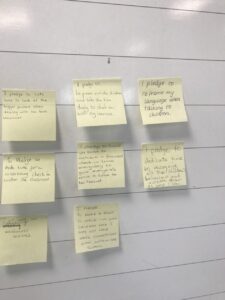
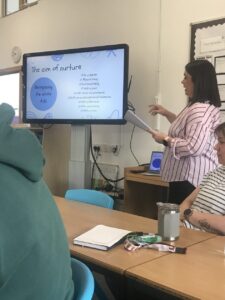
Staff Lanyards: Attachment (Appendix 9)
A lanyard with the SLC Attachment strategy is a simple but powerful tool to help staff across a school use consistent language and approaches when supporting pupils—especially those with communication, emotional, or attachment needs. It acts as a quick visual reminder of key strategies, ensuring that all adults interact with pupils in ways that are supportive, predictable, and aligned with our school’s nurture and attachment principles.

Education Scotland Keeping Trauma in Mind Training (Appendix 10)
Many of our staff members attended the online training sessions hosted by Education Scotland focusing on ‘Keeping Trauma in Mind’. Within the sessions, participants explored staff wellbeing, attachment, recognising and responding to trauma and co/self regulation. At Kirklandpark, our staff have a strong focus on continued professional development to support their knowledge of being able to recognise how early relationships shape emotional and behavioural patterns, understand the impact of trauma on development and day-to-day functioning, and apply strategies that promote safety, connection, and resilience.
‘Keeping Trauma in Mind’ Education Scotland (Appendix 10)
West Partnership Training (Appendix 11)
Many of our staff attended the West Partnership training on co-regulation and de-escalation, strengthening our collective capacity to support pupils using attachment- and trauma-informed approaches. The training deepened staff understanding of how to recognise stress responses and how to use calm, supportive strategies to help pupils regain control during moments of heightened emotion.
West Partnership Co-regulation and De-escalation (Appendix 11)
Staff Sharing Sessions (Appendix 12)
As a staff team, we are committed to regularly planning refresher sessions on our Relationships and Nurture Policy to ensure consistent, high-quality practice. These sessions support shared understanding, strengthen our trauma-informed approach, and promote continuity in how we build relationships and provide nurturing, attuned support across the setting. Recently, we had one of these inputs at our in-service day, as we have had a number of new members of staff join our team and wanted to ensure that we are using the same language when approaching our children.
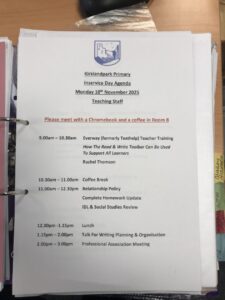
SAMH Staff Wellbeing Plan (Appendix 13 a&b)
SAMH delivered a staff wellbeing session focused on supporting the emotional demands of teaching. As practitioners we often take home the challenges of our day and the worries of our pupils. We recognise as a team that staff too require support in managing the stress inherent in our roles. The session provided practical guidance on recognising the impact of stress, maintaining healthy boundaries, and embedding self-care strategies through the framework of a wellbeing plan.
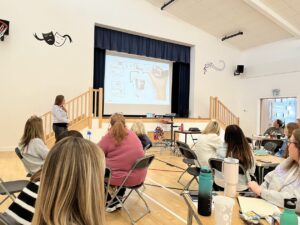
SAMH Staff Wellbeing Plan (Appendix 13a)
SAMH Staff Wellbeing Training (Appendix 13b)
Fact Story Action (Tracking and Monitoring) (Appendix 14 a-c)
When planning, staff carefully consider the individual needs of our pupils—not only academically, but also their background, experiences, and personal stories. We recognise the bigger picture of each child and understand how their wellbeing can influence their engagement and progress in learning. Our staff are committed to creating an environment where meaningful learning can take place, ensuring that children feel safe, secure, heard, and nurtured before expecting them to achieve academically.
Fact Story Action – Pupil Tracking Conversations (Appendix 14a)
Attainment Meeting Minutes (Appendix 14b)
Attainment Meeting Minutes (Appendix 14c)
QI 2. Attachment-Informed, Trauma Sensitive approaches underpin crisis prevention and intervention practices.

Nurture Nook (Appendix 15)
Our Nurture Nook provides an area for children to develop important social skills such as empathy, cooperation, and communication, enabling them to form positive relationships with both peers and adults. Over time, pupils build greater self-esteem, resilience, and independence, allowing them to handle challenges more effectively. Within our school, we have scheduled nurture time with a specific intervention focus through the use of Boxall Profiles for each child. Our space can also be used, as and when it is required for the nurture needs of our pupils across the school.
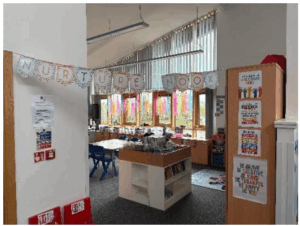
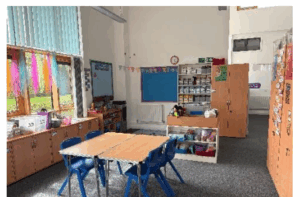
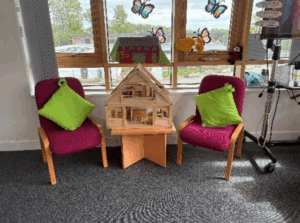
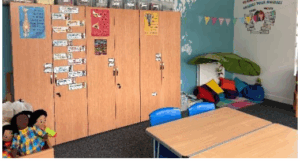
Nurture Break Out Spaces (Appendix 16)
Break-out spaces for nurture in our school are small, calm areas designed to give pupils a safe place to regulate their emotions, reflect, and reset before re-engaging with learning. They form an important part of a whole-school nurturing approach, ensuring that emotional wellbeing is supported alongside academic progress.
When pupils feel overwhelmed or dysregulated, having a designated, predictable space to step away allows them to calm down in a supported and dignified way. This reduces the likelihood of escalation and helps children return to class feeling more settled and ready to learn.
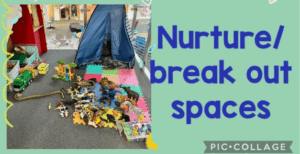
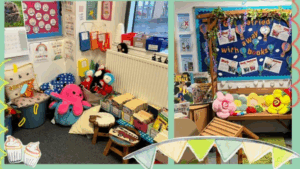
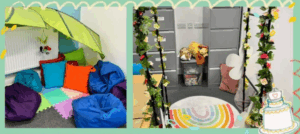
Staff Training Sessions- Mindfulness (Appendix 17)
Training staff in mindfulness helps to promote resilience, improve pupil wellbeing, and enhancing the quality of interactions across the school. Our staff model mindful behaviour, to create a more regulated and positive learning environment, helping pupils feel safe, understood, and ready to engage.
Mindfulness Training Sessions (Appendix 17)
Do Be Mindful (Appendix 18)
Staff have undertaken ‘Do Be Mindful’ training to enhance their understanding and delivery of mindfulness practices in school. This training equips staff with strategies to help pupils develop self-awareness, focus, and emotional regulation through mindfulness techniques.
Circle Framework (Appendix 19a&b)
At the beginning of the year, all of our staff have been trained in the Circle framework. Learning about the practical tools for assessment, planning, and intervention. The Circle framework will help to support our staff in early identification of need of targeted strategies that build resilience, strengthen relationships, and enhance emotional regulation. Our SLT are now looking at how we can embed this further within our school to ensure we meet the needs of all of our children at Kirklandpark.
CIRCLE Inclusive Classroom Scale (CICS) (Appendix 19a)
CIRCLE Participation Scale (Appendix 19b)
Finger Tracing Sessions (Appendix 20)
Finger tracing was introduced by Miss Mackenzie during Children’s Mental Health Week as a way to support children’s emotional development and structure self-regulation. By engaging in these activities for a short space of time throughout the day, it helps to promote self-calming, allowing children to settle and engage more effectively in learning tasks.
St Phnx Happy Place Workshop (Appendix 21)
Some of our pupils took part in the St Phnx musical workshop. By providing a safe and supportive space for children to express their emotions through art and music, the workshop aimed to promote mental health awareness and empower young people to explore and identify their own “happy place.” This experience encouraged creativity, emotional expression, and positive wellbeing.
Relaxation and Massage Sessions (Appendix 22)
We have introduced relaxation and massage techniques as part of our wellbeing approach. These activities help pupils develop strategies to relax, regulate their emotions, and build a sense of calm and safety within the school environment. By incorporating these practices, we aim to support pupils’ overall wellbeing and readiness to learn.
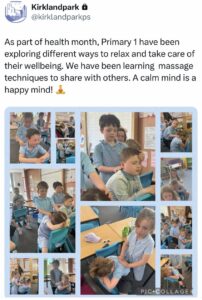

Breathing Techniques (Appendix 23)
Classes use breathing techniques to support pupils’ emotional regulation and overall wellbeing. These simple, accessible strategies help children manage stress, improve focus, and develop a sense of calm during the school day. By practising controlled breathing, pupils gain valuable tools they can use independently to regulate their emotions. Here is Room 2 doing some Rainbow Breathing with Mrs Clarke and Mrs Smith.


Pupil Wellbeing- Common Room (Appendix 24)
To support our pupils social wellbeing, our Common Room is open to P6&7 pupils every morning. This provides opportunities for our pupils to come into school and play games with their peers at the beginning of the day. A member of staff is on hand for emotional check ins and having a quite place to go in the mornings helps the transition from home to school and reduce social anxiety for those pupils who are overwhelmed in our playground.
Children’s Mental Health Week (Appendix 25)
During Children’s Mental Health Week, our focus was on teaching pupils about their emotions and equipping them with practical strategies to support their wellbeing. Through a range of activities and discussions, pupils explored how to recognise, understand, and manage their feelings, helping them develop healthy coping skills and a stronger sense of emotional awareness.
Children’s Mental Health Week 2025 (Appendix 25)
Kirklandpark Health Month (Appendix 26a&b)
At Kirklandpark, staff and pupils celebrate ‘Health Month’ in May. Staff plan a daily health focus from P1-7 and implement a range of lessons linked to social, emotional and physical health. Activities such as yoga, fitness, positive affirmations and mindfulness.
P1-3 Kirklandpark Primary Health Month (Appendix 26a)
P4-7 Kirklandpark Primary Health Month (Appendix 26b)
Targeted Emotional Check Ins (Appendix 27)
We carry out targeted emotional check-ins with pupils to ensure they feel supported and understood. These check-ins provide valuable opportunities for children to share how they are feeling, allowing staff to respond promptly to any concerns and offer appropriate support. This proactive approach helps promote emotional wellbeing and strengthens relationships between pupils and staff.
Room 5-11 Daily Check-ins (Appendix 27)
QI 3. Pupils have access to targeted interventions to support emotional regulation and minimise distressed behaviour—based in the establishment or community—as needed.

Targeted Individual Strategies (Appendix 28)
We implement targeted individual strategies to ensure pupils’ needs are met effectively. These tailored approaches allow staff to provide the right level of support, intervention, or challenge based on each child’s unique circumstances. By personalising strategies, we help pupils feel understood, supported, and better equipped to engage positively in their learning.
Individual Strategies (Appendix 28)
Individual Pupil Timetables (Appendix 29)
We have introduced specialised pupil timetables for individuals who require additional structure or adapted learning experiences. These personalised timetables help ensure that pupils receive the right balance of support, routine, and targeted interventions throughout the school day. By tailoring the timetable to their specific needs, we help pupils feel more secure, supported, and nurtured.
WY Individual Timetable (Appendix 29)
Enhanced Transition (Appendix 30)
We provide an enhanced transition programme to support pupils as they move between stages or settings. This structured approach helps reduce anxiety, build confidence, and ensure pupils feel prepared for the changes ahead. By offering additional visits, personalised support, and opportunities to build relationships with new staff, the programme promotes a smooth and positive transition experience.
Enhanced Transition Letter EM (Appendix 30)
Additional Support Plans (Appendix 31)
We have a number of children with ASP’s which consist of individual targets related to literacy, numeracy and or health and wellbeing. These individual support plans are created through discussions with previous and current teachers as well as SLT and SST input. Staff take into account potential trauma and triggers when creating targets and thinking about the strategies, interventions and adaptations required for the children in their care to settle and thrive.
CS ASP 2025-2026 (Appendix 31)
Specialist Support Reviews (Appendix 32)
SLT and SST liaise on a weekly basis, organising and planning for children throughout the primary stages to ensure progress in attainment and engagement. Adaptations and strategies are discussed and integrated into their daily plans and meetings are held with teachers to ensure they have an understanding of the child’s background, difficulties and triggers.
JW Assessment November 2024 (Appendix 32)
Equine Therapy (Appendix 33)
As part of the supports and interventions put in place, and through many discussions with one set of parents a referral was made to a business to request a block of sessions of Equine Therapy for a child in our care who was having difficulties socially and in building relationships.
EBSNA (Appendix 34 a-c)
Within our school we have one pupil who has attended school but very quickly that changed and they became a school refuser. We spent a lot of time discussing with parents and the pupil ways we could adapt the environment, reduce their anxiety in attending in the morning, adapting their routine to suit their mood, sleep patterns as well as the way work was presented. Through discussions with other agencies such as Specialist Support and Educational Psychologist, we made small steps. We have sought advice in regards to non attenders and the ESBNA website and documentation has been shared, which gave us a better understanding of emotional based non attendance and additional ways of helping the young person in question.
https://www.catalystpsychology.co.uk/emotional_based_school_avoidance (Appendix 34a)
Early-help-assessment-practitioners-guide-26-09-24 (Appendix 34b)
EBSNA-Support-Plan-Template-1 (Appendix 34c)
Exchange Counselling Service (Appendix 35)
A number of referrals have been made for families to the ‘Exchange’ Counselling service. These referrals have been made after meetings and discussion with the parents and children in question. Hearing from the children and parents has been the heard of discussions.
Exchange Referral (Appendix 35)
KOOTH Mental Health Support (Appendix 36)
We have had discussions with parents who are struggling to talk to their children about the mental health and have found difficulties engaging their children in discussion regarding their emotions. The information sent through to the families was just one avenue we discussed.
Meet the Teacher (Appendix 37)
We offer ‘Meet the Teacher’ sessions to support a smooth and positive transition for pupils. These sessions provide children with the opportunity to become familiar with their new teacher, ask questions, and build early relationships. This helps reduce anxiety, boosts confidence, and ensures pupils feel more prepared and comfortable as they move into the next stage of their learning. Sessions also include parents to support pupils’ transitions and foster strong home–school partnerships. These sessions provide parents with the opportunity to meet their child’s teacher, understand the curriculum and expectations, and discuss ways to support learning at home. By engaging parents early, we help ensure a smooth transition and a consistent approach to each pupil’s development and wellbeing.
Meet the Teacher (Appendix 37)
Emotional Check In Charts (Appendix 38)
Staff consider the potential impact of trauma and have regular emotional check ins with their pupils. Our staff use this to engage in dialogue with our pupils, discussing their emotions, what may have caused them to feel this way and what they feel in their body (linking with the Emotion Works strategies). This allows staff to monitor each child’s emotions, helping staff plan/adapt their learning to suit the needs of the individuals and provide emotional support for our young people.
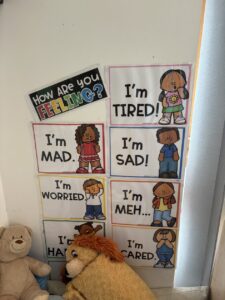
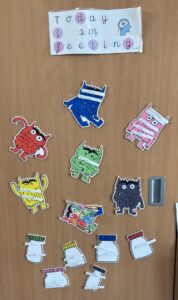
Nurture Interventions (Appendix 39a-c)
Staff are asked to complete the initial consultation form after completing the Boxall Profile to see if a nurture intervention as an individual or in a small group would be beneficial. Information regarding nurture and nurture groups is shared with parents as part of the initial consultation. Parents are given the opportunity to contact the school and discuss their child’s needs and ask questions related to nurture as there can be misunderstanding relating to this term and how it is used in relation to the groups.
Nurture timetable (Appendix 39a)
Nurture Sessions (Appendix 39b)
Drawing and Talking (Appendix 40)
We provide Drawing and Talking interventions to support pupils’ emotional wellbeing. This therapeutic approach allows children to express their thoughts and feelings through drawing and guided conversation in a safe, supportive environment. By encouraging self-expression and reflection, these interventions help pupils develop coping strategies, build resilience, and improve their emotional and social wellbeing.
Drawing and Talking (Appendix 40)
Emotion Coaching Training (Appendix 41)
Staff have received Emotion Coaching training to enhance their ability to support pupils’ emotional development. This approach equips staff with strategies to recognise, validate, and guide children through their emotions, promoting self-regulation, resilience, and positive relationships. By embedding emotion coaching across the school, we create a consistent and nurturing environment that supports pupils’ wellbeing and learning.
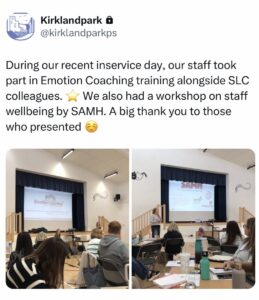
Emotion Works Programme Overview (Appendix 42)
We have implemented the Emotion Works health programme to support pupils’ emotional literacy and wellbeing. This structured programme helps children recognise, understand, and manage their emotions, develop coping strategies, and build resilience. By embedding this approach across the school, we aim to create a positive and supportive environment where pupils feel safe, understood, and empowered to engage fully in their learning.
Emotion Works Overview (Appendix 42)
Kit Bag (Appendix 43)
By providing a simple and structured way to check in with pupils, our staff use Kitbag to encourage emotional expression, help build empathy, and promote the development of trust and positive relationships. It supports the growth of deeper connections, improves our pupil’s social skills, and strengthen friendships.
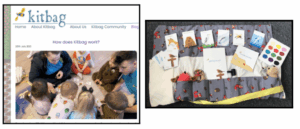
Soft Start (Appendix 44)
Soft starts are implemented at the beginning of the school day to help pupils transition calmly into learning. These structured yet flexible periods allow children to settle, regulate their emotions, and prepare mentally for the day ahead.
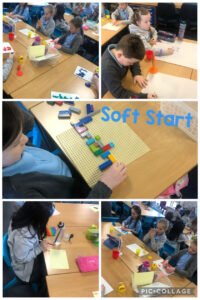
QI 4. There is a commitment to embody a relational approach to managing conflict in contrast to a behaviour management approach.

Online Training- PPRUDB and Attachment (Appendix 45)
Staff have received training focused on promoting positive relationships and understanding distressed behaviour. This training equips staff with strategies to build strong, supportive relationships with pupils, recognise triggers for challenging behaviour, and respond effectively in a calm and empathetic manner. By fostering positive interactions and understanding underlying needs, staff are able to create a safe and nurturing environment that supports both wellbeing and learning.
PPRUDB and Attachment – Learn Online Course (Appendix 45)
Flip Your Lid Training (Appendix 46 a&b)
Staff have participated in “Flip Your Lid” training by Dr. Dan Siegel, focusing on understanding the brain and how emotional regulation impacts learning and behaviour. This training helps staff recognise the signs of dysregulation, support pupils in managing their emotions, and promote self-regulation strategies. By applying these insights, staff can create a calmer, more responsive learning environment that supports pupils’ emotional wellbeing and engagement.
Flip Your Lid Training (Appendix 46a)
Hand Brain Model (Appendix 46b)
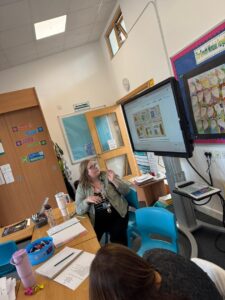
Boxall Profile Targets (Appendix 47)
We use the Boxall Profile to identify specific social, emotional, and behavioural needs of pupils and to inform targeted nurture interventions. By analysing each child’s profile, we can set clear, personalised targets to support their development, track progress, and implement strategies that promote confidence, emotional regulation, and positive relationships. This approach ensures interventions are tailored to individual needs, enabling pupils to thrive both socially and academically.
Boxall Profile Pupil (Appendix 47)
Staff Library (Appendix 48)
We have established a staff library to support continuous professional development. The library provides access to a range of resources, including books, research, and practical guides, allowing staff to expand their knowledge, refine teaching strategies, and stay up to date with best practices. This initiative encourages ongoing learning, collaboration, and reflection, contributing to improved outcomes for both staff and pupils.
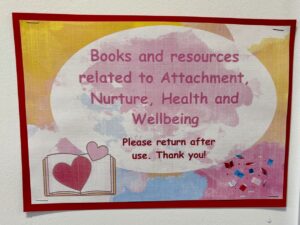
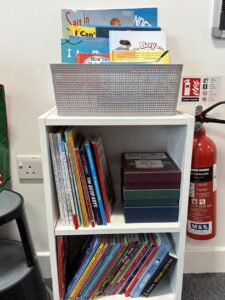
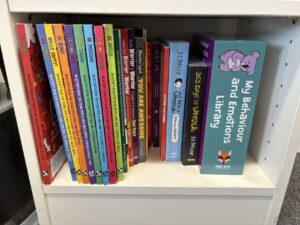
Peer Mediation (Appendix 49)
Our Playground PALS have received peer mediation training to support conflict resolution and promote a positive school culture. This training equips our pupils with the skills to listen actively, facilitate constructive dialogue, and help resolve disagreements respectfully. By empowering pupils to mediate peer conflicts and fostering a collaborative approach, the programme encourages responsibility, empathy, and stronger relationships across the school community.

Playground PALS Targets (Appendix 49)
Pupils ‘Kept in Mind’ (Appendix 50 )
Staff make positive comments to children on a regular basis both in class and throughout the school. This can be children in their class or passing in the corridor or in the lunch hall, All staff take an interest in all pupils, from SLT, teaching staff, support staff, office staff, janitorial and catering. Comments can be in regards to siblings, new hair cuts, pets, weekend plans or sports/hobbies they are involved in. Building these relationships are key to ensuring children feel comfortable speaking to us about their worries and trouble, but it all starts with them speaking to us about the positive and enjoyable aspects of their lives.
Growth Mindset (Appendix 51)
Our pupils recognise that each person learns in different ways and we celebrate that everyone has their own style of learning. Each child is able to talk about their strengths and aspects of their learning they need to develop. We place a big emphasis on having a Growth Mindset and through HWB lessons, explore that every child will have strengths in different CfE areas, work at different paces and learn in different ways. Mistakes are good and we can learn from them!
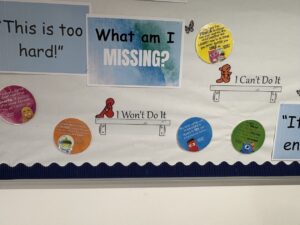

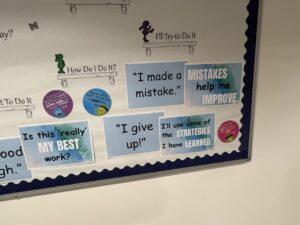
SHANARRI (Appendix 52)
Each term we focus on one of the eight wellbeing indicators during assembly. Each class will then go back to their classrooms to discuss the indicator in more depth in order to fill out the appropriate section of the wheel. Children will write or draw how this indicator relates to their lives, providing opportunities for pupils to discuss with their peers and their teacher. Staff use this to gain a better insight into their learners, families and background- using this to support our pupils.

Class Charters (Appendix 53)
We implement Class Charters in every classroom to establish clear expectations, promote positive behaviour, and create a shared sense of responsibility among pupils. Developed collaboratively with the class, these charters outline agreed rules and values, helping to foster respect, inclusivity, and a supportive learning environment. By referring to the charter regularly, pupils are encouraged to take ownership of their actions and contribute positively to the classroom community.
Class Charters/ Pupil Rights (Appendix 53)
Homework Diaries (Appendix 54)
Homework diaries are used as a key tool to support behaviour, communication, and working in partnership with parents. They provide a consistent channel for sharing information about pupils’ learning, progress, and achievements, as well as any concerns or reminders. By maintaining regular communication through homework diaries, staff and parents can work collaboratively to support pupils’ academic development and positive behaviour, ensuring a consistent and supportive approach both at school and at home.
Homework Diaries (Appendix 54)
Handover Notes (Appendix 55)
We maintain detailed handover notes that include key pastoral information and effective strategies for supporting individual pupils. These notes ensure continuity of care and learning when staff changes occur or when pupils transition between classes. By sharing insights about what works best for each child, staff can provide consistent support, address specific needs promptly, and create a stable and nurturing environment for all pupils.
Morning Greetings (Appendix 56)
We incorporate morning greetings as part of our daily routine to foster a positive start to the school day. These interactions allow staff to connect with pupils individually, helping them feel welcomed, valued, and emotionally ready to learn. Morning greetings support the development of positive relationships, set a respectful tone for the day, and contribute to pupils’ overall wellbeing.

